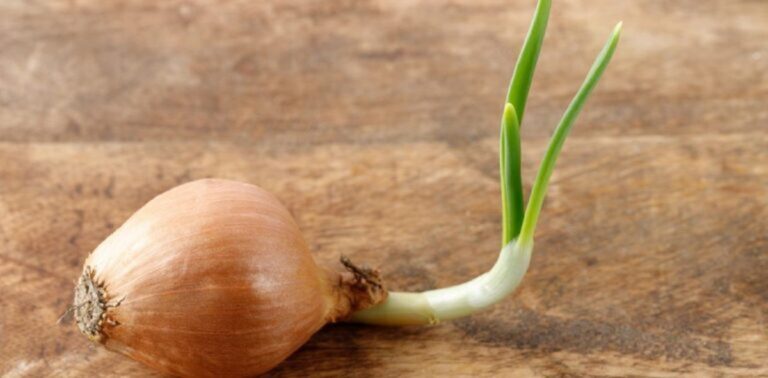Have you ever opened your pantry only to find an onion that’s started to sprout? You might have wondered, “Is this still safe to eat?” or “How can I make the most of it?” Don’t worry—sprouted onions are not only safe but can also add a fresh, vibrant touch to your meals. Let’s explore the ins and outs of sprouted onions, from their edibility to tips on keeping them fresh and even growing your own sprouts at home.
The Edibility of Sprouted Onions
Onions are a kitchen staple around the world, beloved for their versatility and flavor. When an onion begins to sprout, it might look a bit different, but it’s still perfectly safe to eat. In fact, sprouted onion greens can be a delightful addition to your dishes. Imagine adding finely chopped sprouts to your omelets, salads, or even sprinkling them over a hearty bowl of rice. These green shoots bring a fresh, slightly peppery flavor that can elevate your culinary creations.
I remember the first time I discovered sprouted onions in my kitchen. Initially, I was hesitant, but after experimenting, I found that the sprouts added a wonderful zest to my morning eggs. It was a pleasant surprise to turn what seemed like a sign of impending spoilage into a tasty enhancement!
It’s important to differentiate between sprouted onions and other sprouted vegetables like potatoes, which can be harmful if consumed in large quantities. While sprouted onions are safe and nutritious, sprouted potatoes contain solanine, a compound that can cause stomach discomfort.
Keeping Onions Fresh
Proper storage is key to extending the life of your onions and preventing premature sprouting. Here are some tips to keep your onions fresh longer:
- Store in a Cool, Dark Place: Onions thrive in environments that are cool (around 64-68°F or 18-20°C), dry, and dark. Avoid storing them near potatoes, as potatoes emit moisture that can accelerate sprouting.
- Use Breathable Containers: Keep onions in breathable containers like mesh bags, baskets, or even paper bags. This allows air circulation, which helps prevent moisture buildup and spoilage.
- Separate from Other Produce: Onions should be stored separately from other fruits and vegetables to avoid transferring strong odors and moisture, which can lead to faster deterioration.
- Regular Checks: Periodically inspect your onions for any signs of spoilage or sprouting. Remove any affected onions to prevent them from impacting the others.
According to the U.S. Department of Agriculture (USDA), proper storage techniques can significantly extend the shelf life of onions, ensuring they remain a reliable ingredient in your kitchen.
Growing Your Own Sprouted Onions
If you’re interested in gardening or want to enjoy fresh onion greens, growing your own sprouted onions is easier than you might think. Here’s a simple guide to get you started:
- Choose the Right Onion: Select onions that have already started to sprout. These can be found in your pantry or purchased from a garden center.
- Prepare the Soil: Use loose, well-draining soil in a container or garden bed. Onions prefer a sunny spot, so choose a location that receives plenty of sunlight.
- Planting: Place the sprouted onion in the soil, ensuring that only the roots are buried while the green shoots remain above ground. Planting too deep can hinder growth.
- Watering: Keep the soil consistently moist but not waterlogged. Onions need regular watering to thrive, especially during dry spells.
- Fertilizing: Use a balanced fertilizer or compost to provide essential nutrients. This encourages healthy growth and robust sprouts.
- Harvesting: Once the green shoots have grown to a desirable length, you can start harvesting them for use in your cooking. Be sure to leave some growth for continued harvesting throughout the season.
I started growing sprouted onions in small pots on my balcony, and it quickly became a rewarding hobby. Watching the green shoots emerge and flourish brought a sense of accomplishment, and having fresh onion greens at my fingertips was a delicious bonus!
Cooking with Onions
Onions are incredibly versatile in the kitchen, forming the base of countless dishes from soups and stews to sautés and salads. Sprouted onions add a unique twist to traditional recipes, offering both flavor and nutritional benefits.
- Salads: Add chopped sprouted onions to your salads for a fresh, crunchy texture and a burst of flavor.
- Omelettes and Scrambled Eggs: Incorporate the green sprouts into your morning eggs for an extra layer of taste and a pop of color.
- Sandwiches and Wraps: Use sprouted onion greens as a healthy alternative to lettuce or other greens in sandwiches and wraps.
- Garnishes: Sprinkle the sprouts over finished dishes as a garnish to enhance both the visual appeal and the flavor.
Additionally, sprouted onions are rich in vitamins and minerals, including vitamin C, vitamin K, and folate, making them a nutritious addition to any meal.
Final Thoughts
Sprouted onions are far from being a sign of spoilage—they’re a versatile and nutritious ingredient that can enhance your cooking in unexpected ways. By following proper storage techniques, you can extend the life of your onions and enjoy their fresh greens for longer. Whether you choose to incorporate them into your favorite recipes or take the plunge into growing your own, sprouted onions offer both practicality and flavor to your culinary adventures.
Next time you spot a sprouted onion in your pantry, don’t toss it out. Embrace the sprout and discover the delicious possibilities it brings to your kitchen. Happy cooking!






